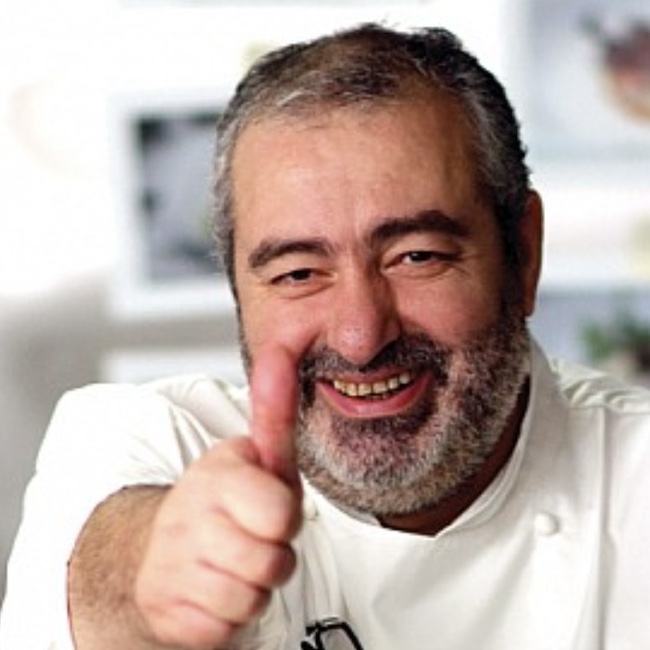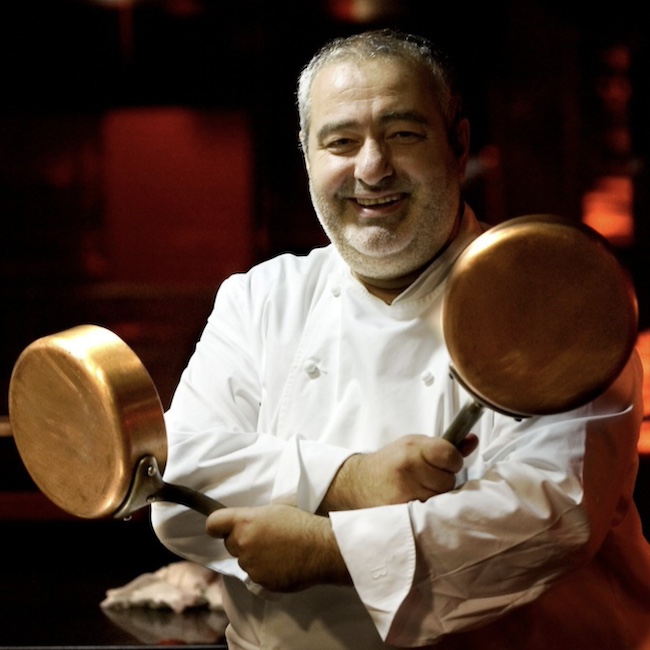.png.transform/rendition-xs/image_image%20(1).png)
Santi Santamaría
An outsider, a culinary master and a defender of the best product
Santi Santamaría, (Sant Celoni, Barcelona 1957-Singapore 2011), was a fervent proponent of Catalonian culture, especially its gastronomy. He considered himself an artisan chef and a "team leader" in the kitchen. He was not keen on attending gastronomy congresses so was seen by some of his colleagues and by critics as something of an outsider but, at the same time, he was acknowledged as being constantly young in spirit, having a real fascination for gastronomy and being an excellent after-dinner conversationalist. His culinary universe focused on the principles of classic cuisine and the flavors of tradition. He preferred to get everything he can out of his raw materials rather than to work with the latest techniques. In his opinion, good products obtain everything they need from nature, so the perfect formula is simply top-class ingredients with proper cooking. There is one point he insisted on. His restaurant was not just his cooking. It was also the service received in the dining-room, the wine, the atmosphere, the surroundings. "From the cooker to the table and from the table directly to the senses".

“The chef is an artisan of excellence, but not an artist. It is cuisine itself that is art." - Santi Santamaría
Local roots, global ambition
Far from the media attention that requires constant innovation in the field of gastronomy, Santamaría argued that it is repetition in the kitchen that was the real challenge, because it required improving on what is already known. If asked about the main influences on his career, he mentioned Alain Chapel and quoted from one of his books, "Cooking is more than recipes. It is a philosophy, and a passion”. Santi Santamaría studied Technical Engineering but it was not meant to be. Instead, he decided to join the family business, a restaurant in the farmhouse he was born in. It was in 1981 that the real change took place, when he and his wife converted his parents’ establishment into El Racó de Can Fabes. After thirteen years of work, in 1994, Santamaría became the first Catalonian chef to receive his third Michelin star. But he wanted to go still further. In 2000, he landed in Madrid, at the Santceloni restaurant in the Hesperia Hotel, quickly earning it two stars. In 2002 he opened up two new areas at El Racó de Can Fabes, one for after-dinner conversation (Espai Coch), and another for a more private dining experience (Dins Bar). A few months later, he opened up a small hotel with contemporary-style suites. The cycle seemed to be coming to an end but in late 2006 yet another creation appeared, the Evo restaurant in the Hesperia Towers Hotel in L'Hospitalet del Llobregat (Barcelona), with Ismael Alegría, one of his protégés, as chef de cuisine. In the 2007 edition of the Michelin guide, Evo received its first star. The third star at El Racó de Can Fabes came before the third for Ferran Adrià, also from Catalonia. The two complement each other but have different approaches to gastronomy. Santamaría is in favor of what is solid and identifiable, whereas Adrià's cuisine is more ethereal. While firm in his ideas, he respects the difference, "Diversity is always enriching, and in this profession, there is room for whatever is honest and sincere, for what arouses emotions and represents a service for customers.”

"Rescuing and updating traditions in an era where novelty for novelty's sake prevails can be a revolutionary act." - Santi Santamaría
One of the lines of research by Santi Santamaría was how to gain even greater benefit from the pig and pork products. He always favors using local products, especially if they can be grown in the area of his restaurant using organic methods. anti Santamaría, one of Spain's leading chefs, left us on 16 February 2011, right here in his own restaurant in Singapore. His death was completely unexpected, but paradoxically, it also seemed very symbolic, as it came while he was working and showing his Singapore-based restaurant to a group of international journalists who had been invited to see Singapore's most famous restaurants.
